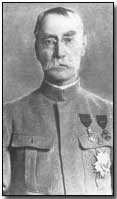Who's Who - Joseph Gallieni
 Joseph Gallieni (1849-1916) was born at
Saint-Beat on 24 April 1849. He trained at the military academy in
Saint-Cyr before serving in the Franco-Prussian War of 1870-71. He was
subsequently posted to Africa in the mid-1870s.
Joseph Gallieni (1849-1916) was born at
Saint-Beat on 24 April 1849. He trained at the military academy in
Saint-Cyr before serving in the Franco-Prussian War of 1870-71. He was
subsequently posted to Africa in the mid-1870s.
After serving in Martinique Gallieni was made governor of French Sudan, during which time he successfully quelled rebellion by Sudanese rebels. From 1892-96 he served in French Indochina before being dispatched to Madagascar, where he again suppressed revolt, this time of monarchist forces. He served as governor of Madagascar until 1905, building a reputation as a fair, just governor.
A widespread choice of supreme commander of the French Army in 1911, Gallieni declined the position in favour of Joseph Joffre, pleading advancing age and ill-health.
Retiring from the army in April 1914, Gallieni was recalled in August to assist in the defence of Paris prior to the First Battle of the Marne. Joffre, wary of Gallieni's influence and reputation, to an extent marginalised Gallieni's role, keeping him at arm's length from headquarters, although it is widely believed that it was Gallieni's energy and foresight which saved Paris.
Gallieni saw an attacking opportunity when the German First Army turned east in early September, sending the Sixth Army to strike its flank, and subsequently rushing reserves to the front by taxi in response to German counter-attacks. Credit for the success of the defence of Paris was however largely assigned to Joffre.
He subsequently served as minister of war in October 1915 before retiring, again citing ill-health in March 1916; his relationship with Joffre had proved a quarrelsome one. The strain of high office having broken his already fragile health, Joseph Gallieni died on 27 May 1916, and was posthumously appointed Marshal in 1921.
Click here to view brief film footage of Gallieni from 1914.
The "linseed lancers" was the Anzac nickname assigned to members of the Australian Field Ambulance.
- Did you know?
